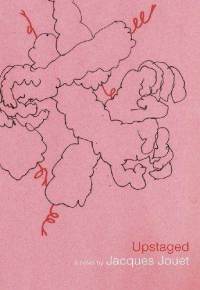Fuse Book Review: Upstaged — When The Stage Rebels Against the Page
French writer Jacques Jouet’s novella Upstaged is an ingenious comedy about theatrical transformation that runs with the notion that when art is live anything goes, that perhaps Pirandello’s six characters in search of an author didn’t go far enough and come up with a better play amongst themselves.
Upstaged by Jacques Jouet. Translated from the French by Leland De La Durantaye. Dalkey Archive, 96 pages, $14.95.
Mountain R by Jacques Jouet. Translated from the French by Brian Everson. Dalkey Archive, 143 pages, $12.95.
By Bill Marx.
Deep down, most critics rage against the theater’s predictability more than they do against the dying of the (spot)light. When it comes to fair-to-middling stage scripts (most of what is produced), the die has been cast forever. No matter how well a play by Neil Simon—or name your own candidate for mediocre dramatist—is acted, directed, and produced, it is still Plaza Suite, still The Last of the Red Hot Lovers. Thus is born the reviewer’s fantasy that somehow the theater, which is live after all, invites spontaneous miracles. Lightening can strike, dross can be turned into gold—what is on the page doesn’t necessarily have to make it onto the stage.
French writer Jacques Jouet is a critic, playwright, novelist, and short story writer, and he has heard that siren call—his novella Upstaged is an ingenious comedy about theatrical transformation that runs with the notion that when an art is live anything goes, that perhaps Pirandello’s six characters in search of an author didn’t go far enough and come up with a better play amongst themselves.
In 1983 Jouet was elected to Oulipo, a celebrated author’s organization (whose members have included Raymond Queneau, Georges Perec, and Italo Calvino ) dedicated to constraining literary form in challenging ways. There are suggestions in the text that he is playing an intellectual game—yet there is enough impish humor and theater savvy in the writing to make Upstaged more than just an empty exercise—it is a droll cry for a kind of impossible freedom.
The idea is simple enough: It is early in the run of a new play entitled Going Out to the People, written and directed by Marcel Flavy. Two notable critics sit in the audience, the conscientious Alexandre Botsinas of The Morning Republic, who has a published copy of the script on his lap, and an unidentified reviewer who sleeps through most of the performance. As related by the assistant director, who gathers together all the various accounts of what happened, things went helter-skelter early in the second act.
One of the leads, Nicholas Boehlmer, is about to go on stage when he is accosted in his dressing room by a man who proceeds to tie up and gag the actor. The man, whom the assistant refers to as the Usurper, is costumed and made up to play Boehlmer’s character. The mystery man tells the actor he admires his work, that “I am indeed taking a part of you, but you will soon find it returned unharmed,” and goes on stage to play the role.
Jouet has lots of fun with the resulting off-stage hysteria. There are critics in the audience, so Flavy feels helpless to stop the proceedings, even bonking Boehlmer on the head when, after the actor has been set free, he tries to barge onto the stage to reclaim his part. Meanwhile, the impostor starts off by delivering the dramatist’s lines fairly accurately but then changes them, improving the dialogue, eventually making up speeches that force the actors to improvise or, in the case of one performer, faint dead away.
In front of the audience and the puzzled but admiring eyes of the dramatist, the Usurper reinvents the play for the better: what began as a diagrammatic political drama in which former higher ups in the government square off as enemies turns into a deeper, more ambiguous exploration of the corruption of official power, one of Jouet’s major concerns.
The gargantuan perfidy of elected authorities is at the center of an earlier Jouet novel in translation (2004), Mountain R, which also takes a dramatic form, this time around Ibsenite revelation of evil rather than Pirandellian comedy. A speech by a clearly dotty leader of the Republican Council calling for economic stimulus via the building of a 1,500-meter-high mountain (stuffed with garbage) is followed by a confessional interview between a father and daughter and a witness recounting (and re-spinning) his courtroom testimony. Mountain R and Upstaged are part of Jouet’s La République Roman, an expansive cycle of novels that dissect the skulduggery of official power.
The wrong-doing in Mountain R is clear cut; Upstaged is more elusive. Is the Usurper a savior or a devil? Is this an act of patronizing revenge or the wish fulfillment of a frustrated amateur? Why did the man do it? The Usurper skedaddles at the end of the second act, though not before having a fling with one of the production’s comely actresses, so sex may have been the motive.
The conceit is delicious, and Jouet could have done more to make it tastier. Because the story is told by the assistant director, we are (frustratingly) outside of the minds of the performers who must scramble as they never have before. And surely the novelist could have been extended the reality/illusion dramatics—wouldn’t someone have called the police about a stranger on the stage?
Still, this is one of the rare books about the theater that balances poking fun at overblown egos and dramatizing intriguing ideas, and in which the critic plays a liberating rather than a debilitating role. In his review, Botsinas nails what happened on stage, spotting the imaginative energy that the Usurper’s spontaneity injected into the production:
“The result is a reflection of our struggle to locate the true seat of power in the theater: the street or the palace, the stage or the director, the players or the script. It’s a shame that all of this is completely invisible in the published version of the play.”
Leland De La Durantaye’s translation evokes the formal friskiness of Jouet’s prose, and he provides a useful afterword about an author who should be better known in this country. This highly entertaining book, as well as the earnest but interesting Mountain R , makes me very curious about Jouet’s plays.
At the end of Upstaged, the performers and director speculate about the motives of the Usurper, their scenarios ranging from psychological revenge to political revelation. One tantalizing explanation is left out of the company’s brainstorming: the possibility that the novel is the dream of the unnamed critic at the beginning of the book who sleeps through the production. Jouet is a playwright who is aware of the primal critical fantasy that somehow, someway, the reviewer will be rescued from the oppressive destiny of the script.
Tagged: Dalkey Archive, Jacques Jouet, Leland De La Durantaye, Mountain R



